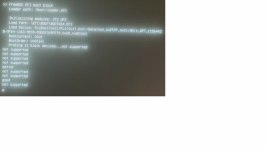Remember we are talking about home users here and not actual sever grade requirements or obsessive compulsive data freaks. Just like most home user would not buy or know what ECC is.
"I have never been hit by lighting, so obviously all lightning storms are safe"
About 2,000 people are killed worldwide by lightning each year with 1,400,000,000 strikes every year and with a world parasitic population of 7000000000, the odds are in you favour.

aren't inerested in troubleshooting configurations known to have issues.
So why bother participating in the forum. In other words, by your statement you would determine a BSD or TrueNas bug to be the fault of a Realtec NIC just because the user has a Realtec card, you would then advice the user to go out and buy Intel cards for no reason other than prejudice.
Actually, I also remember many many years ago Freenas broke WOL on Intel cards I think. Luckily no one criticised Intel.
I'll give an example from about 6 plus years ago or so. Currently the recommendation is to have the boot drive on SSD's or something, NOT USB's due to the writes corrupting them. Well, this is what I found since the System Dataset was dumped in them.
This happened over two years:
First time corrupted > replaced.
Second time corrupted > replaced and moved System Dataset to old scrap 40GB Hdd experiment (bonus side effect, System now boots in 2 minutes and shutsdown in less than 1 minute or so.)
Third time corrupted > Detached formatted and all that without physically removing, mirrored again and shortly there after corruption again.
I then stopped and thought about it, USB to PC is a plug and socket connection using 5VDC for power and data any interference or dodgy connection will/can affect. USB's sit there permanently so the join gets tired. I un-plugged and plugged back the Boot drives several times. Rebooted and it re-silvered itself, data corruption gone. Those very same "corrupted" USBs have been running for over 5 years. All I do now is once every 12 months I un-plug and plug then in a few times. As said over 5 years and no corruption yet. Haven't you had to un-plug and re-seat a video card on any PC.
the recommendations are intended to make that highly unlikely
So by my experience using USB's as boot drives is rock solid barring connection issues that exist with everything and As long as the System Dataset is elsewhere for boot speed and shutdown
you ignore that at your risk, but that the key; it's your risk.
That's always a two way street.
In general I agree and understand what you said but it sometimes gets annoying when people post and try to influence their opinion on how things are supposed to be based on their own assessment on how things should be. I've seen some users advice others that why do you want to shutdown your sever Truenas is not intended to be shutdown, blah, blah, blah. Even I asked a question no long ago about expanding TN capabilty and was responded with maybe TN is not for me and I should try OMV or other. Thanks, can I get a refund for the last 13+ years I've been using FN/TN, not only that but have you ever heard of new features.
In any case all hardware have issues, hence a little known obscure thing called warranty.
Sorry, I've had my rant.

